The large powerful body of the German Shepherd lay still in the pick up truck bed. Only his rapid shallow breathing and occasional feeble movement let me know he was still alive. “I saw him eat some “rat bait” last week, but he seemed okay, so I figured there was nothing to worry about” his owner told me confidently. I lifted his upper lip and noticed the pale white gums and purple bruised typical of the life threatening hemorrhage that occurs when rat poison disrupts blood clotting.
I explained this to the owner, and discussed the blood transfusions, which would be needed to save “Chief’s” life. His owner shook his head, explaining that he couldn’t afford this treatment, but he didn’t want to euthanize his dog. I didn’t know if this was fair to the old watch dog but I went to get the antidote shot to see if we could stabilize him with minimal treatment.
A few moments later Chief passed away, before I could even draw up the dose. Had we only seen the dog sooner, a simple, inexpensive antidote, a special form of Vitamin K, would have saved his life. If you see your pet get into a toxin, consult your Vet right away!
RAT POISON: the rest of the story!
1) No rat poison is safe for dogs or cats, but some are more dangerous than others.
2) The best rat poison is none at all. Consider adding a kitty to the household! They
are equally effective against mice, rats, moles, chipmunks, squirrels – you name
it!
3) If that is not an option, and you must use a rat poison, be very careful about
which one you choose. BE SURE IT SAYS TO USE VITAMIN K AS AN
ANTIDOTE! These anticoagulant preparations are the only type of rat poison
that is easily treated. Other types cause kidney failure or swelling of the brain,
have no antidote, and are frequently fatal.
4) Vitamin K responsive / anticoagulant rat poisons are only easy to treat if you
discover the ingestion quickly. If bleeding is already occurring – something that
usually takes a couple days to develop – treatment is intensive, expensive and
may not save your friend.
5) If your pet eats rat poison, call your veterinarian immediately. You will probably
be advised to give hydrogen peroxide ASAP at a dose appropriate to your pet to
induce vomiting. It is a good idea to keep some in your medicine chest! You will
then need to have your friend seen for an exam. Your veterinarian will prescribe
the right dose and duration of vitamin K for your pet.
6) Rat poison has no expiration date, even if there is one on the box. I once had a
cat poisoned by rat poison she found in the attic, which had been placed there
by the previous owners of the house. The current owners had lived there for 10
years, making that box of poison over 10 years old! (The kitty was treated and
recovered.)
 Xylitol? OH NO! It’s in your sugarless gum, sugarless mints, and other diet foods and it can KILL your dog. It’s absorbed quickly and it doesn’t take much. Keep your sugarless products away from pets, beware the purse surfing dog and call your veterinarian immediately if your dog ingests any suspect product.
Xylitol? OH NO! It’s in your sugarless gum, sugarless mints, and other diet foods and it can KILL your dog. It’s absorbed quickly and it doesn’t take much. Keep your sugarless products away from pets, beware the purse surfing dog and call your veterinarian immediately if your dog ingests any suspect product.
Xylitol is a sugar substitute, which humans can eat without any problems, but some species of animals, dogs in particular, cannot eat. In the dog xylitol causes a life-threatening drop in blood sugar, followed by severe liver damage. Xylitol is absorbed very quickly—after chewing a piece of gum the xylitol enters a dogs blood stream within 15 minutes! It doesn’t take a lot either—2 sticks of gum in a small dog, one pack of gum in a large dog and life threatening problems can occur. Treating Xylitol toxicity requires close monitoring for 72 hours, which can get expensive. Protect your pet—keep sugarless products out of reach. Beware of purses and book bags because dogs can often smell the gum and may go searching through such areas to find the source of that yummy smell.
Veterinary scientists at the University of Liverpool have found that, like humans, obese dogs can experience metabolic syndrome, a condition that describes multiple health issues that occur in the body at the same time. 
The condition occurs when a number of health problems, such as increased blood glucose and increased cholesterol levels, develop together, with the potential to increase the risk of other diseases, such as cardiovascular disease and diabetes.
Although canine obesity is known to cause insulin resistance, mild hypertension, and high blood cholesterol levels, it has not, until now, been investigated for links to metabolic syndrome, which is common in obese humans.
In a study involving 35 obese dogs, 20% were found to have metabolic syndrome. Similar to humans with the condition, obese dogs had increased blood insulin, suggested that the pancreas is working harder than normal to control blood glucose. Blood adiponectin, a protein produced by fat cells that helps control sugars and fats, was also at lower levels than normal. It is yet to be determined, however, what the exact health impacts of these issues are on dogs, and if they are similar to the diseases that metabolic syndrome can cause in humans.
The team demonstrated, however, that the metabolic abnormalities identified in obese dogs, improved when they successfully lost weight.
Dr Alex German, from the University’s Department of Obesity and Endocrinology, said: “It is estimated that one third to a half of the UK dog population is overweight. A previous study that we conducted showed that a dog’s quality of life improved with weight loss, resulting in better vitality and reduced emotional distress.
“This new research creates a lot of new questions for us. It suggests that dogs develop metabolic syndrome, similar to humans with obesity-related health problems. We now need to investigate, however, what health consequences this may have for dogs. The key point for us is that the problem can be resolved with successful weight loss, and this must be a priority for pet owners with obese dogs.”
The study is published in the BMC Veterinary Research.
Story Source:
The above story is reprinted from materials provided byUniversity of Liverpool.
Note: Materials may be edited for content and length. For further information, please contact the source cited above.














Social